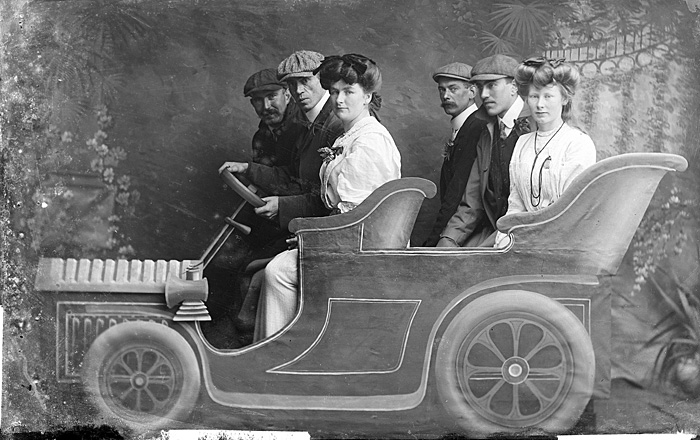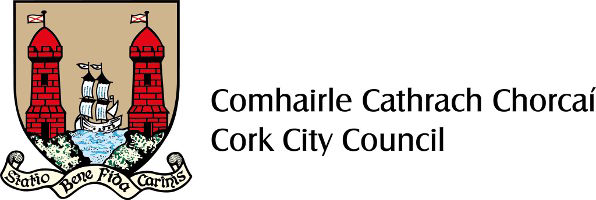Family History and Genealogy
Researching Genealogy and Family History in the Cork City and County Archives
Our collections document many people, property, events and places in Cork. To begin, we recommend doing a search of our online catalogue. The archives listed on our online catalogue, and collections pages, are mainly in hard copy and may be accessed, by prior appointment, in our research room. Please note that we are unable to undertake detailed genealogical research for the public, however we may provide a limited research service.
PLEASE NOTE: We do not hold birth, marriage, or death certificates: These are held by the General Register Office of Ireland, and older records are also freely searchable on www.irishgenealogy.ie
We have burial records ranging from the 1870s to the 1990s, from over 20 cemeteries in Cork city and county.
See the list of Cemetery/Burial Records held here. These are mainly in hard copy.
Burial records from a small number of these cemeteries are also available online in our digital archive.
For records that are not online, you may access our research room in order to view records in person. We also provide a (limited) research service.
Electoral Registers, 1957 - 1991
These contain the names and addresses of those registered to vote. Access: Hard copy only by appointment. Registers more than 30 years old are open for general research.
- Cork Borough / Cork City 1957/8, 1963/4, 1966 - 1991
- Cork North East, 1965-1982
- Mid Cork, (Mid West and North West of County Cork ) 1965-1982
- Cork South West, 1965-1991
- Cork South Central, 1982-1991
- Cork East, 1982-1991
- Cork North Central, 1983-1991
- Cork North West, 1982-1991
- South Kerry, 1969-1982
Also held is a series of 4 election poll books plus 1 electors register for Youghal Borough, 1830-1837
Note: Cork City Library, Cork County Library and the National Archives of Ireland also hold some Cork electoral registers
Hospital and Home Records 1880-1960
See our collections pages for lists of hospital and home records held. Access: Hard copy only. Restrictions apply to personal records that are less than 100 years old.
Local Government 1600s-1990s
See our collections pages for an outline of local authority archives held. These archives are in hard copy only and may be accessed in our research room by appointment.
See our collections pages for a list of school archives held. These archives are in hard copy only and may be accessed in our research room by appointment. Access restrictions apply to personal records less than 100 years old. The access restriction does not apply to records of deceased persons.
Poor Law Union/Workhouse Records: 1838-1923
From 1838, Ireland was divided up into poor law unions. Within each union was a workhouse where the poor and the destitute could be accommodated. There were 15 poor law unions in Cork city and county. Each union was run by a separate Board of Guardians, that each maintained a separate set of records. See the Boards of Guardians collections page for full lists of all records. For genealogical purposes, the most important documents are those recording inmates. These comprise indoor relief registers and related records, that record the name, address, occupation, age, sex, condition, date of admission, and date of discharge or death of inmates.
We hold extensive inmate and related records for the following poor law unions/workhouses in Cork:
- Cork Poor Law Union and workhouse (Cork City and rural hinterland)
- Kinsale Poor Law Union and workhouse (West Cork)
- Midleton Poor Law Union and workhouse (East Cork)
A small amount of inmate and related records are also available here for the following poor law unions/ workhouses in Cork;
- Bandon Poor Law Union, West Cork, 1920-1925
- Macroom Poor Law Union, Mid-West Cork, 1916-1921
- Youghal Poor Law Union, East Cork, 1848-1851
For the other poor law unions/workhouses in County Cork, it is mainly administrative records that survive, such as minute books recording the proceedings of meetings of the board of guardians of each union. These will give information on what was happening in the workhouse/poor law union, but they only occasionally contain personal information about inmates. These records often do record the names of officials and staff of the board/union.
Access: These archives are in hard copy only and may be accessed in our research room by appointment.
Local Postal/Trade Directories and Almanacs 1821- 1973
Local directories and almanacs contain names and addresses, occupations, and information on businesses, trades, and officials of governmental and public institutions and other organisations. The Archives collection of these spans the period 1821 to 1973 and contains several directories not available in Cork City Library. The directories are in hard copy and are available to view in our research room. See the Directories and Almanacs section of our collections pages.
Access: These archives are in hard copy only and may be accessed in our research room by appointment.
Rate Valuation Lists: 1880s- 1980s
Property rate/tax valuation lists, of which the Griffith's/Primary Valuation was the first, record the names of occupiers and immediate lessors of property, extent of property, its valuation, and rates due. Valuation lists remained in use for several years, and changes, eg in ownership, were noted. Cork City lists are arranged by ward/electoral area. The main body of County valuation lists held consist of volumes for the years 1908 to c.1948, with one or more volumes for each electoral division within each rural district. Also held are valuation lists covering the years from c.1888 to 1897 arranged by barony, based on the old Cork baronies as per the earlier Primary Valuation (Griffith’s Valuation) in the 1850's.
- Valuation Lists, Cork City 1883-1938
- Valuation Lists, County Cork, c1888-1984
- Rate and Valuation Books, Fermoy, County Cork, 1861-1979
- Rate and Valuation Books, Mallow, Co Cork, 1936-78
Access: These archives are in hard copy only and may be accessed in our research room by appointment.
Other collections in CCCA of family history interest
- Solicitors' & Landed Estate Papers contain material such as deeds and tenant rental ledgers, marriage settlements, wills, and property records such as leases and deeds of sale, for a great many Cork families.
- Collections of business archives, often containing staff material.
- Various small collections that include some personal/family material (search online catalogue)
- Society of Friends (Quaker) records, Cork and Munster, c.1650 - 1909
- Paddy O’Keeffe Papers: consist of local history and genealogical writings and notes concerning the Bantry area and other parts of West Cork.
- O'Kief, Coshe Mang, several volumes, published by Dr. A.E. Casey, contains transcriptions of many original genealogical sources, including transcripts of birth, baptismal and marriage records for a number of parishes in the North Cork/Blackwater valley and Cork/Kerry border areas of north County Cork. (Hard copy only)
- See our collections section and search our online catalogue for more information
Civil birth marriage and death records, from 1864 (and from 1845 for non-Roman Catholic marriages) are held by the General Register Office of Ireland and on www.irishgenealogy.ie.
The Irish Archives Resource web site has lists of material available in archives across Ireland.
Published books, newspapers, directories and other sources are available in Cork City Library, local studies department, Grand Parade, Cork and Cork County Library, Model Farm Road, Cork. The Cork Past and Present website has much useful material online.
The National Archives of Ireland, Bishop Street, Dublin, has ‘Griffith’s Valuation’ c.1847-1864, the Tithe Applotment Books 1823 – 1837 and the 1901 and 1911 Census and also provides a genealogical advice service.
Many parish/church records for Cork are now available on the Irish Genealogy web site http://www.irishgenealogy.ie/ .
Catholic church records are also to be found with local parishes http://www.corkandross.org/ and http://www.cloynediocese.ie/ and also in the National Library of Ireland http://www.nli.ie/. For Church of Ireland (Anglican) parishes contact the Representative Church Body Library, Dublin. Regarding Presbyterian congregations in Cork contact the Presbyterian Historical Society, Church House, Belfast.


